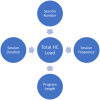Dosing of Health and Wellness Coaching for Obesity and Type 2 Diabetes: Research Synthesis to Derive Recommendations
- PMID: 37304739
- PMCID: PMC10248368
- DOI: 10.1177/15598276211073078
Dosing of Health and Wellness Coaching for Obesity and Type 2 Diabetes: Research Synthesis to Derive Recommendations
Abstract
Health and wellness coaching (HWC) is an effective intervention for lifestyle disease such as obesity and type 2 diabetes. The evolving HWC profession needs recommendations to guide clinical practice, particularly the appropriate dose of coaching. The purpose of this paper was to systematically review and synthesize HWC literature to derive HWC programming recommendations. Of 102 papers retrieved, 88 were retained with data extracted determining HWC session number, frequency, duration, program length, and total coaching load. Differential analysis yielded no statistical difference in programming variables for randomized control trials and other designs, nor for studies with significant findings v. those not finding statistical significance, allowing these data to be pooled. The HWC intervention for obesity was slightly more intense (15 sessions over 7-8 mo) than the diabetes programming (12 sessions over 9-10 mo). On average, HWC programming applied in the peer-reviewed literature was 12-15 sessions of 35-40 min duration over 7-9 months. These recommendations for HWC programming variables are put forth as initial practice guidelines and should be examined with comparative effectiveness study for optimization. HWC best practice guidelines for other patient groups (e.g., heart disease, cancer, and chronic pain) should also be studied once an adequate literature data base is available.
Keywords: behavior change; diabetes; health coaching; obesity; wellness.
Copyright © 2022 The Author(s).
Conflict of interest statement
The author(s) declared no potential conflicts of interest with respect to the research, authorship, and/or publication of this article.
Figures
References
-
- Pirbaglou M, Katz J, Motamed M, Pludwinski S, Walker K, Ritvo P. Personal health coaching as a type 2 diabetes mellitus self-management strategy: a systematic review and meta-analysis of randomized controlled trials. Am J Health Promot. 2018;32:1613-1626. doi:10.1177/0890117118758234. - DOI - PubMed
-
- U.S. Department of Veteran Affairs . Success with health and well-being coaching codes. Available from:https://www.va.gov/WHOLEHEALTH/features/Health_and_Well_Being_Coaching_C.... (accessed 21 July 2021).
-
- National Government Services . Preventive services guide: intensive behavioral therapy for obesity. Available from:https://www.ngsmedicare.com/ngs/portal/ngsmedicare/newngs/home-lob/pages....(accessed 21 July 2021).
Publication types
LinkOut - more resources
Full Text Sources



